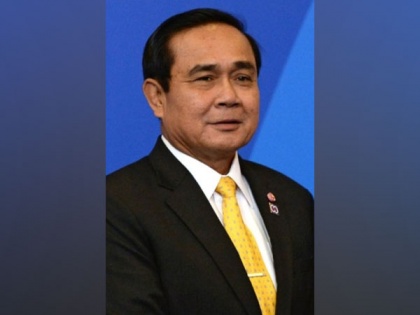Thailand delays purchase of Chinese-made submarines after public backlash
By ANI | Published: September 1, 2020 11:11 AM2020-09-01T11:11:45+5:302020-09-01T11:25:18+5:30
The Thai government on Monday delayed the purchase of Chinese-made military submarines for a year following public outrage over the controversial agreement.

Thailand delays purchase of Chinese-made submarines after public backlash
The Thai government on Monday delayed the purchase of Chinese-made military submarines for a year following public outrage over the controversial agreement.
The Royal Thai Navy asked the parliament's budget committee to slash the submarine procurement funding to zero for this fiscal year, a person well-versed with the matter said, Nikkei Asian Review reported.
Government spokesperson Anucha Burapachaisri said that Prime Minister Prayuth Chan-ocha, who also holds the post of Defence Minister, told the Navy to postpone the agreement until the fiscal year 2022.
The decision comes as a setback for the Thai government amid protests by the youth who are seeking political reforms and protections for civil liberties. It also comes as the country's economy has witnessed a slump due to the COVID-19 pandemic.
The two Yuan-class S26T submarines were supposed to cost a total of 22.5 billion baht (USD 720 million) over seven years. An allocation of 3 million baht as initial payment was sought by the government in the 2021 budget. But, the decision invited strong opposition from the public, with critics saying the money should be spent to revive the flattened Thai economy.
Anucha said that Thailand will begin talks with China on the details of the delay.
These are the second and third of three submarines which Prayuth had promised to China and the Royal Thai Navy when he was the leader of a junta that toppled the democratically-elected government of Thailand in 2014, according to Nikkei Asian Review.
In 2017, the budget for the first submarine was approved and it is being built in China for delivery in 2024, the Navy said.
On August 22, the agreement attracted public attention, passing a lower house budget subcommittee by the narrowest margin. The meeting did not yield a unmous conclusion and was tied initially at 4 to 4. However, a ballot from the chairman, who is a member of the ruling Palang Pracharat Party, allowed the deal to proceed to the full budget committee.
Among the four members who opposed this decision was Yutthapong Jarassathian, deputy chairman of the subcommittee from the opposition Pheu Thai Party.
"A memorandum of understanding exchanged upon the first submarine order between Prayuth and then-Chinese Defense Minister Chang Wanquan did not state that Thailand was obliged to buy the two additional submarines," Yutthapong was quoted as saying.
"The Prime Minister must choose between the submarines and the economic survival of the people," he said.
The subcommittee's decision was met with criticism on social media, with a hashtag #PeopleSayNoToSubs trending in Thailand on Twitter. Following this, the Navy was forced to present its views on Monday with Royal Thai Navy chief-of-staff Sittiporn Maskasem commenting that the Navy needed more submarines as to boost its defence sector, and urging the people not to politicise the agreement.
The Thai Prime Minister pushed for a "yes" vote regarding the purchase of the submarines, saying they were vital for national security. "In the next days, everyone will have to take responsibility if something happens to our country," he said.
According to the Navy, most of Thailand's coastal neighbours possess subs. While Vietnam has six submarines, Indonesia, Singapore and Malaysia have five, four and two, respectively. Myanmar has one submarine.
Earlier on August 25, Deputy spokesperson of Democrat Party, Akkaradet Wongpitakrote, had said that at least seven out of 13 Democrats would vote against the agreement, citing economic measures as a long-term and greater priority. The budget committee comprises 48 members from the ruling coaliton and 24 from the opposition.
The COVID-19 pandemic has hit Thailand's economy hard with Gross Domestic Product shrinking 12.2 per cent on the year in the second quarter, which was the biggest contraction since 1998.
The Office of the National Economic and Social Development Council has forecast a contraction of 7.3 per cent to 7.8 per cent for 2020, which could become the worst slump in Thailand's history. The economy had shrunk 7.6 per cent in 1998, when the country was in the midst of the Asian financial crisis, Nikkei Asian Review reported.
Tourism, which accounts for around 20 per cent of the Thai economy, was the hardest-hit industry. Exports, which include spending by tourists, shrank by 28.3 per cent. To revive the sector and overall economic growth, the government has approved a domestic tourism stimulus package which is expected to create two million domestic trips from July to October, thereby helping to generate income for businesses like hotels, airlines, restaurants and travel agencies.
The government has allocated 22.4 million baht budget for the package, nearly the same amount for purchasing two Chinese submarines.
The COVID-19 pandemic has forced the governments across the Asia-Pacific region to rethink about their defence spending. Earlier in June, Japan decided to stop the deployment of US-made Aegis Ashore missile shield after its price swelled up to USD 4 billion from an estimated USD 2.15 billion. The move could likely free up funds for economic recovery.
Last week, Australian Prime Minister Scott Morrison had announced that the government would boost defence spending by 1 billion Australian dollars to upgrade military facilities and provide additional paid employment to army reservists. This decision is expected to boost the country's economy through consumption and construction orders.
( With inputs from ANI )
Disclaimer: This post has been auto-published from an agency feed without any modifications to the text and has not been reviewed by an editor
Open in app